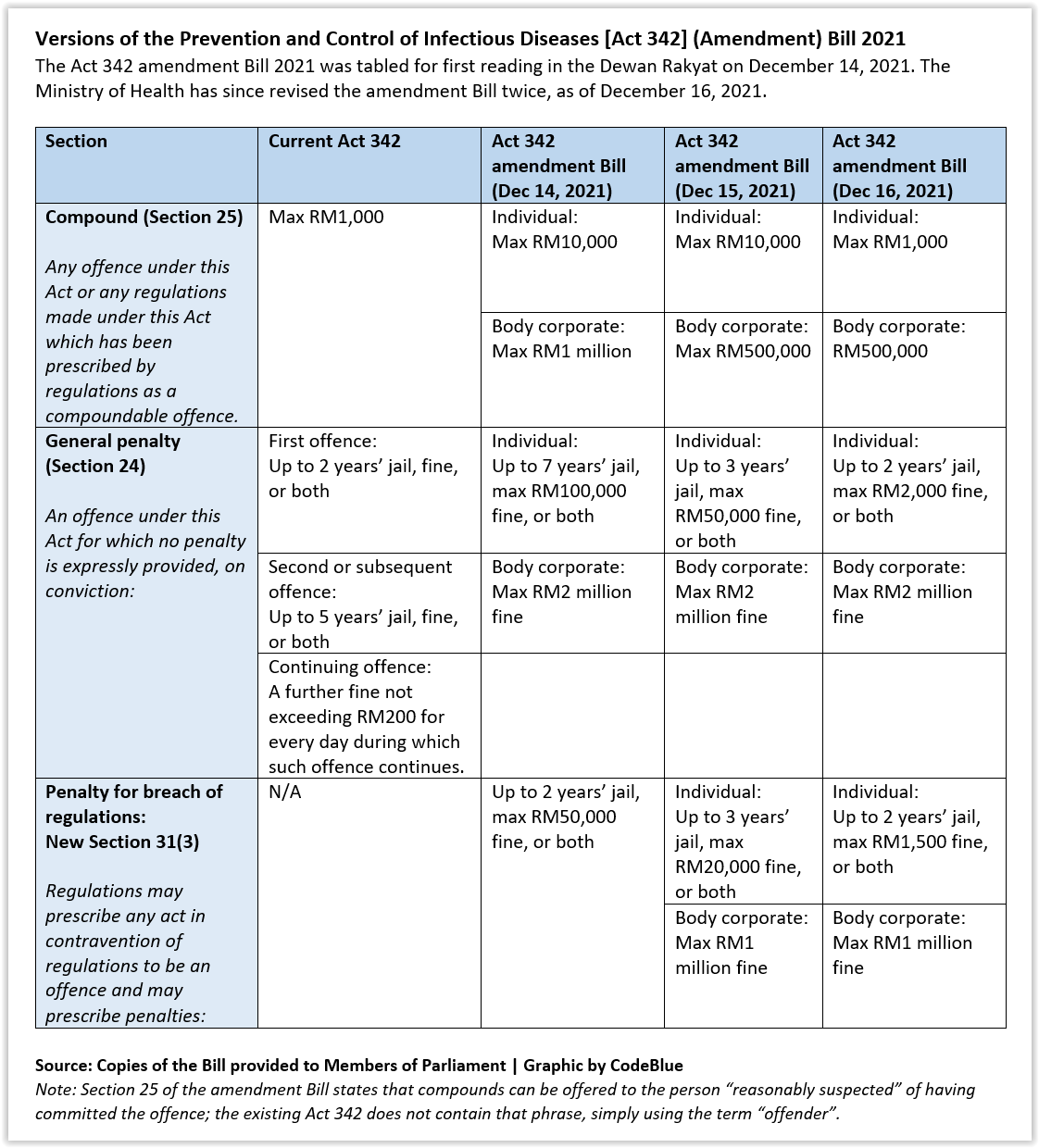KUALA LUMPUR, Dec 17 – The government yesterday revised controversial amendments to Act 342 for the second time, restoring compounds of offences for individuals to the RM1,000 limit in the existing law from an initially proposed RM10,000 ceiling.
The maximum compound for businesses, corporations, or other organisations under Section 25 of the Prevention and Control of Infectious Diseases Act 1988 (Act 342), however, remained at RM500,000, as per the December 15 revision that halved the maximum RM1 million compound mooted in the first version of the amendment Bill tabled in the Dewan Rakyat on December 14.
According to a copy of the changes distributed to MPs yesterday, as sighted by CodeBlue, the December 16 revisions to the amendment Bill further lightened the general penalty for offences under Act 342 upon conviction for individuals to imprisonment not exceeding two years, compared to three years in the December 15 revision and seven years in the original December 14 version.
Under Section 24 of Act 342, the maximum fine for individuals under the general penalty was reduced by 96 per cent to RM2,000 in the December 16 revision from RM50,000 in the December 15 version that was half of the RM100,000 amount in the original December 14 version.
Corporate bodies, however, still face a maximum RM2 million fine under the general penalty upon conviction that has been maintained through all three versions of the Act 342 amendment Bill.
The existing 1988 law – which regulates Covid-19 among other infectious diseases – does not differentiate between individuals and corporate bodies, but distinguishes the general penalty upon conviction between first and second or subsequent offences. The general penalty is for offences upon conviction under the Act for which no penalty is expressly provided.
Upon conviction, offenders are liable to imprisonment of up to two years, a fine, or both for the first offence, as well as up to five years’ jail, a fine, or both for the second or subsequent offence.
On the third set of punishments – a new Section 31(3) proposed in the amendment Bill that limits the penalties upon conviction that may be prescribed by regulations made under Act 342 – the December 16 version further reduced the maximum jail sentence for individuals to two years from three years in the December 15 version.
The maximum fine for individuals was slashed by 92.5 per cent to RM1,500 from RM20,000 in the December 15 version. For corporate bodies, the maximum RM1 million fine was maintained in the December 16 version.
The original amendment Bill tabled on December 14 mooted up to two years’ imprisonment, a maximum RM50,000 fine, or both for all offenders.
Yesterday, Health Minister Khairy Jamaluddin was forced to postpone the tabling of the Act 342 amendment Bill for debate to Monday, amid objections against the harsh punishments for Covid-19 infractions like not wearing face masks coming not just from the Opposition, but also from leaders of his own party, Umno, like former prime minister Najib Razak.
The current Dewan Rakyat meeting, scheduled to end yesterday, was extended solely for the Bill that the government intends to pass on Monday itself, after Khairy first announced the proposed amendments to Act 342 in a TV interview last Sunday night.
Just two hours before the 10am Dewan Rakyat meeting on Monday, the government will discuss the proposed amendments to Act 342 with the health, science, and innovation special select committee chaired by Bandar Kuching MP Dr Kelvin Yii from the DAP.
The severe criminal sanctions under the Health Ministry’s proposed amendments to Act 342 – which Khairy maintains are necessary to curb the imminent threat of the Omicron variant – received furious backlash across all levels of society irrespective of ethnicity, including ordinary citizens, businesses, a workers’ union, lawyers, and even doctors themselves.








